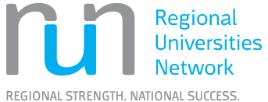RUN study details universities' massive regional impact
Published on 25 June, 2013
A newly released study details for the first time the extraordinary depth of engagement between members of the Regional Universities Network (RUN) and the regions that they serve.
RUN's regional impact study - Regional Universities Network: Engaging with regions, building a stronger nation - demonstrates the myriad ways in which the RUN universities are making significant and diverse contributions to the social, cultural, environmental and economic development of their regions.

RUN Chair David Battersby said: "This study builds on the work already undertaken through RUN's Economic Impact Study, published in March, and allows us to paint the full picture by also taking into account the social, cultural and environmental impacts of our member universities. The World Bank has estimated that intangible capital - human, social and governance - represents 80 per cent of wealth in high-income OECD countries such as Australia. RUN universities are vital in helping to generate such capital in regional areas.
LINK also to CQUni campuses contribute hundreds of millions to their regional economies
"The RUN universities make contributions to their regions through three interrelated core functions: learning and teaching; research and innovation; and service. The study examines how each of these core functions relates to a range of dimensions vital to the development of regional Australia, including human capital development, regional governance and planning, community development, health and ageing, environmental sustainability and industry and business development.
"This new study is a marker of our commitment to improving policy development in the regions and demonstrating the strength of member universities in the regions they serve. As part of this commitment we are advocating a new policy position which charts a new, systematic national strategy that harnesses the remaining untapped potential of regional universities to further drive regional development.
"The new policy framework would enable regional innovation and development, and skills and workforce planning. RUN also proposes that regional universities should be positioned as regional hubs of knowledge exchange and development through a distributed network leveraging the universities' regional engagement strengths to provide leadership, advice, facilitation and expertise in innovation, knowledge exchange and transfer to ensure that regional programs and services are well developed and supported by a strong evidence base.
"The regional university represents one of the largest and most visible assets in the region and is looked to for ‘thought leadership'; it coexists with its regional community in closer physical, social and cultural proximity than is the case in capital cities, and shares close interdependencies with other regional organisations.
"While the case studies identified in our research revealed common themes across the network, there was also substantial evidence to show how responsive RUN universities are to the distinctive attributes and needs of their regions. These needs have been, and continue to be, highly influential in the selection and development of the universities' niche areas of expertise. The RUN universities have made strategic decisions to invest in those areas of education and research that resonate with regional needs and equip them to make strong contributions to regional development.
"RUN universities align their teaching and learning with the needs of their regions to respond to skills shortages and community needs. They have a strong track record in raising educational aspirations and enrolling low SES, Indigenous and mature age students. They are addressing skills shortages.
"Research undertaken by RUN universities is regionally embedded and applied, delivering knowledge and solutions for practical applications in the regions. But it is also globally relevant, and multi-disciplinary and collaborative, in response to the complexity of regionally relevant questions. It stimulates the growth of knowledge-based industries and builds capacity for innovation and sustainable management. RUN universities are developing knowledge-based solutions to support regional environmental sustainability.
"Through service the universities provide regional access to their physical and intellectual resources. They contribute to build capacity for effective regional governance and development. They are enriching the quality of life in their regional communities by providing arts, cultural and sporting facilities and programs, and are contributing to the development of creative industries in regional Australia.
"Through their combined activities RUN universities are building community capacity to address social issues that impact on the liveability of regions. They are filling gaps in regional health care, including in workforce, services and research.
"Our universities believe that it is our civic mission as public institutions to play a central role in contributing to the development of the regions where we are located. Regional engagement is intentionally positioned as one of our core businesses, rather than an add-on to our learning and teaching and research functions.
"Our universities already play a leading role in breaking down silos of knowledge and entrenched practices, acting as brokers, boundary spanners and boundary crossers to bring new ideas and potential ways of doing things to regional Australia, a role that would only be enhanced if the strategy outlined in our new policy position was adopted."
The members of RUN are CQUniversity (CQU), Southern Cross University (SCU), University of Ballarat (UB), University of New England (UNE), University of Southern Queensland (USQ) and University of the Sunshine Coast (USC). All members are headquartered in regional Australia.
The Regional Universities Network acknowledges the specialist assistance provided by Lenore Cooper of Minyon Consulting in the design and conduct of the RUN study.
Follow the Regional Universities Network on:
Twitter: @RegUniNet

